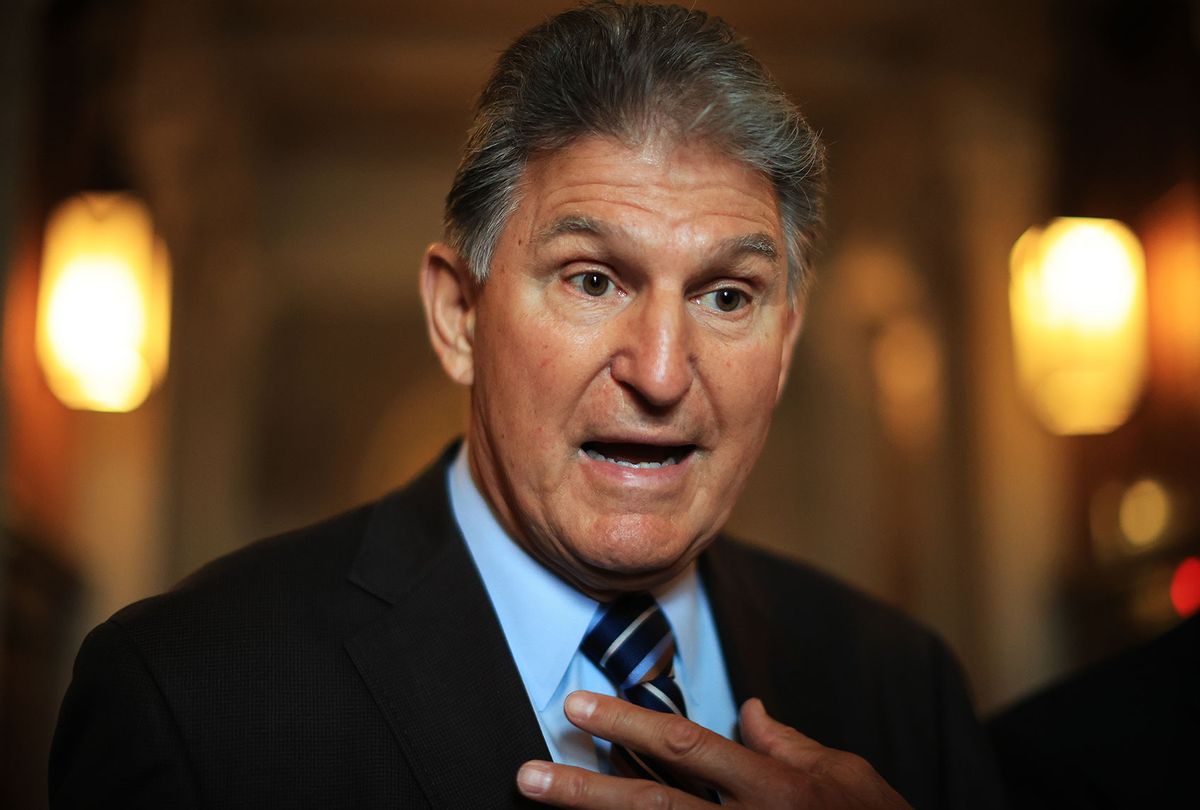Sen. Joe Manchin, the West Virginia Democrat who has positioned himself as a fulcrum of power in the evenly divided Senate, expressed disappointment on Friday after Senate Republicans predictably used the filibuster — which he supports — to block a bipartisan commission to investigate the Jan. 6 Capitol riot.
The Senate voted 54-35 to proceed with the legislation, falling short of the 60 votes needed to defeat a filibuster. Six Republicans joined Democrats to support the resolution, which was negotiated by Rep. John Katko, R-N.Y., the top Republican on the House Homeland Security Committee, at the behest of House Minority Leader Kevin McCarthy, R-Calif., who ended up opposing it anyway. The bill would have created a commission evenly split between the two parties and given both sides subpoena power, cribbing most of the language from legislation that created the bipartisan commission on the 9/11 terrorist attacks.
The defeat was almost inevitable after Senate Minority Leader Mitch McConnell, R-Ky., came out against the commission, reportedly because Republicans are worried it will make them look bad ahead of next year's midterm elections. But the majority support for the resolution left all eyes on the two major defenders of the filibuster in the Senate Democratic caucus: Manchin and Sen. Kyrsten Sinema of Arizona, who did not even show up for Friday's vote.
Manchin, who along with Sinema wrote a letter to "implore our Senate Republican colleagues to work with us to find a path forward" just a day earlier, said after the vote that the Republican opposition was "unconscionable" after Democrats acceded to GOP demands in negotiations to ensure the commission would be truly bipartisan.
"The betrayal of the oath we each take is something they will have to live with," he said in a statement.
Manchin told reporters that he was "very disappointed" and "very frustrated that politics has trumped — literally and figuratively — the good of the country."
Manchin blamed McConnell for making it "extremely difficult" to advance bipartisan measures.
"There's no excuse. It's just pure raw politics. And that's just so, so disheartening. It really, really is disheartening," he told NBC News. "I never thought I'd see it up close and personal that politics could trump our country. And I'm going to fight to save this country."
But many of Manchin's critics on the left are pointing out that he continues to oppose Democratic calls to eliminate the filibuster so the Senate can pass legislation with a simple majority vote. Just one day before the vote, Manchin vowed that he was "not willing to destroy our government" by eliminating the filibuster.
"I think we'll come together. You have to have faith there's 10 good people" in the Republican caucus who will join Democrats to break a filibuster, he said in a statement that aged poorly over the subsequent 24 hours.
"You have it completely backwards, [Sen. Manchin] — the *filibuster* is what's destroying our government," Princeton historian Kevin Kruse wrote on Twitter. "It distorts the founders' vision in which a simple majority would control the Senate and lets a spiteful minority hold the government hostage to its whims. End it now."
Rep. Ilhan Omar, D-Minn., responded to Manchin's comments by noting that "if the GOP was really a party that was able to put country before partisanship, we probably wouldn't be voting on this commission in the first place."
MSNBC contributor Jason Johnson urged fellow Democrats to ramp up pressure on Manchin and Sinema in response to Republican opposition to a bipartisan commission.
"The idea that he will still spout this nonsense in the face of an attempt to murder him and everybody with a 'D' in their name is disturbing to me. And I don't see the value, honestly, at this point, in Democrats treating him with kid gloves," Johnson said Thursday. "Personally … I [as a Democratic senator] would say, look, if you aren't in favor of this commission, then you want me dead as much as some of these Republicans do. That's how I'd be talking about it at this point."
Senate Majority Leader Chuck Schumer, D-N.Y., suggested on Friday that he may force another vote on the bill, but it's unclear what he expects to change in the near future. Among Republicans, only Bill Cassidy of Louisiana, Susan Collins of Maine, Lisa Murkowski of Alaska, Rob Portman of Ohio, Mitt Romney of Utah and Ben Sasse of Nebraska voted to break the filibuster.
"Shame on the Republican Party for trying to sweep the horrors of that day under the rug because they're afraid of Donald Trump," Schumer said on the Senate floor after the vote. "Senate Republicans chose to defend the 'big lie' because they believe anything that might upset Donald Trump could hurt them politically."
Murkowski also criticized her party and McConnell for prioritizing "short-term political gain at the expense of understanding and acknowledging what was in front of us on Jan. 6."
House Speaker Nancy Pelosi, D-Calif., said in a statement that "Republican Senators surrendered to the January 6 mob assault."
"Leader McConnell and Senate Republicans' denial of the truth of the January 6th insurrection brings shame to the Senate. Republicans' cowardice in rejecting the truth of that dark day makes our Capitol and our country less safe," Pelosi said. "Democrats worked across the aisle, agreeing to everything that Republicans asked for. We did this in the interest of achieving a bipartisan Commission. In not taking yes for an answer, Republicans clearly put their election concerns above the security of the Congress and country."



Shares